
Kent Brockman is a fictional character in the animated television series The Simpsons. He is voiced by Harry Shearer and first appeared in the episode "Krusty Gets Busted". He is a grumpy, self-centered local Springfield news anchor.

alt.tv.simpsons is a usenet newsgroup dedicated to discussing the American television program The Simpsons. Created in 1990, the newsgroup became a popular community in the early 1990s, and continues to exist as of 2020. It is known for reviewing episodes and nitpicking minor details on the show.
"Lisa's Wedding" is the 19th episode of The Simpsons' sixth season. It originally aired on the Fox network in the United States on March 19, 1995. The plot focuses on Lisa visiting a carnival fortune teller and learning about her future love. It was written by Greg Daniels and directed by Jim Reardon. Mandy Patinkin guest stars as Hugh Parkfield and Phil Hartman guest stars as Troy McClure. The episode won an Emmy Award in 1995 for Outstanding Animated Program, becoming the third episode of The Simpsons to win the award.

"Marge vs. the Monorail" is the twelfth episode in the fourth season of the American animated television series The Simpsons. It originally aired on the Fox network in the United States on January 14, 1993. The plot revolves around Springfield's impulse purchase of a faulty monorail from a conman, and how it subsequently falls to Marge to stop the train from destroying the town.

Kenneth Keeler is an American television producer and writer. He has written for numerous television series, most notably The Simpsons and Futurama. According to an interview with David X. Cohen, he proved a theorem that appears in the Futurama episode "The Prisoner of Benda".
¡Ay, caramba!, from the Spanish interjections ay and caramba, is an exclamation used in Spanish to denote surprise. The term caramba is also used in Portuguese. "¡Ay, caramba!" is used as a catchphrase of Bart Simpson from the animated sitcom The Simpsons.
"All Singing, All Dancing" is the eleventh episode of The Simpsons' ninth season. It originally aired on the Fox network in the United States on January 4, 1998. In the fourth Simpsons clip show, Homer claims he hates singing, so Marge shows family videos of musical numbers from previous seasons. Additionally, the episode itself takes the form of a sung-through musical, featuring spoken dialogue only at the start and end of the episode. The original material was directed by Mark Ervin and written by Steve O'Donnell. It was executive produced by David Mirkin. It features guest appearances from George Harrison, Patrick Stewart and Phil Hartman, although these are all clips and none of them recorded original material for the episode.
Ian Howes Maxtone-Graham is an American television writer and producer. He has formerly written for Saturday Night Live (1992–1995) and The Simpsons (1995–2012), as well as serving as a co-executive producer and consulting producer for the latter.
"Blood Feud" is the twenty-second and final episode of The Simpsons' second season. It originally aired on the Fox network in the United States on July 11, 1991. In the episode, Mr. Burns falls ill and desperately needs a blood transfusion. Homer discovers Bart has Burns' rare blood type and urges him to donate, thinking the Simpsons will be handsomely rewarded. After receiving the blood transfusion, Burns sends them a card with no money. Marge convinces Homer not to send an insulting reply to his boss, but when Bart mails the letter anyway, Burns is livid. He later forgives Homer and sends the Simpsons a giant Olmec carving to show his gratitude.
"The Itchy & Scratchy & Poochie Show" is the fourteenth episode in the eighth season of the American animated television series The Simpsons. It originally aired on the Fox network in the United States on February 9, 1997. In the episode, The Itchy & Scratchy Show attempts to regain lost viewers by introducing a new character named Poochie, voiced by Homer. The episode is largely self-referential and satirizes the world of television production, fans of The Simpsons, and the series itself. It was written by David X. Cohen and directed by Steven Dean Moore. Alex Rocco is a credited guest voice as Roger Meyers, Jr. for the third and final time ; Phil Hartman also guest stars as Troy McClure. Poochie would become a minor recurring character and Comic Book Guy's catchphrase, "Worst episode ever", is introduced in this episode.
"My Sister, My Sitter" is the seventeenth episode of The Simpsons' eighth season. It originally aired on the Fox network in the United States on March 2, 1997. In the episode, Marge and Homer leave Lisa to babysit Bart and Maggie. Annoyed that his younger sister is his babysitter, Bart does everything he can to annoy her. When Bart is injured, Lisa must find him medical attention without spoiling her reputation as a good babysitter.
"Selma's Choice" is the thirteenth episode of The Simpsons' fourth season. It originally aired on the Fox network in the United States on January 21, 1993. In the episode, Selma decides to have a baby, inspired by her late aunt's wish that she not spend her life alone. She experiences what life with children is like by taking Bart and Lisa to the Duff Gardens amusement park, which does not go as planned.
"Another Simpsons Clip Show" is the third episode of The Simpsons' sixth season. It originally aired on the Fox network in the United States on September 25, 1994. In the episode, Marge reads a romance novel in bed, and it prompts her to have a family meeting, where the Simpson family recall their past loves in form of clips from previous episodes.
"Homer vs. Patty and Selma" is the 17th episode of The Simpsons' sixth season. It originally aired on the Fox network in the United States on February 26, 1995. In the episode, Homer loses all his money in pumpkin stocks and must turn to Patty and Selma for a loan. Meanwhile, Bart takes up ballet lessons, and his instructor is voiced by actress Susan Sarandon.
"Bart the Fink" is the fifteenth episode of The Simpsons' seventh season. It originally aired on the Fox network in the United States on February 11, 1996. In this episode, Bart inadvertently ruins Krusty the Clown's career by accidentally exposing Krusty as one of the biggest tax cheats in American history. Driven to despair, Krusty fakes his suicide and adopts an alias. Bart and Lisa convince Krusty to become a television clown again.
"Bart's Inner Child" is the seventh episode of The Simpsons' fifth season. It originally aired on the Fox network in the United States on November 11, 1993. In the episode, Marge — realizing her excessive nagging spoils the family's fun — seeks help from self-help guru Brad Goodman. He praises Bart's irreverent attitude and encourages his followers to emulate Bart's care-free antics. Soon everyone in Springfield starts to act like Bart, who feels that his role as a troublemaker is usurped. After the inaugural "Do What You Feel Festival" ends in calamity and a riot, the town decides to stop acting like Bart.
"Secrets of a Successful Marriage" is the twenty-second and final episode of The Simpsons' fifth season. It originally aired on the Fox network in the United States on May 19, 1994. In the episode, Homer fears he may be a little slow, so he goes to the adult education center. While there, he decides to teach a class of his own on the secrets of a successful marriage, since that is the only class he is qualified to teach. However, to keep his students interested, he is forced to tell personal secrets about his wife Marge, which she dislikes, leading up to Homer getting kicked out of the house.

A fictional city refers to a town, city or village that is invented for fictional stories and does not exist in real life, or which people believe to exist without definitive proof, such as Plato's account of Atlantis.

"The Simpsons Theme", also referred to as "The Simpsons Main Title Theme" in album releases, is the theme music of the animated television series The Simpsons. It plays during the opening sequence and was composed by Danny Elfman in 1989, after series creator Matt Groening approached him requesting a theme. The piece has been noted by Elfman as the most popular of his career.
RickPolizzi is an American television producer and author. He is the creator of the book Spin Again, animation producer on the successful television series The Simpsons, and creator of Los Angeles based Halloween haunt Boney Island.






